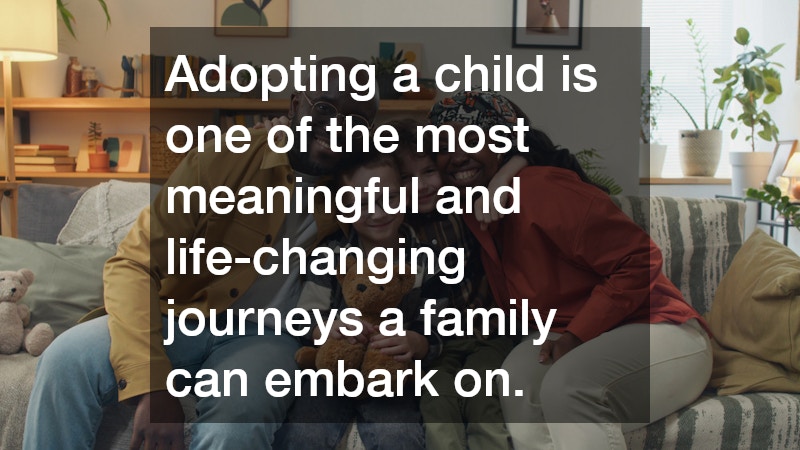Adopting a child is one of the most meaningful and life-changing journeys a family can embark on. Whether you’re seeking to adopt through an agency, privately, or through foster care, the process is filled with legal requirements, paperwork, and emotional steps. To ensure that everything is handled correctly, many prospective parents turn to adoption attorneys for professional guidance. These legal professionals not only provide clarity but also protect your rights and the child’s best interests.
But before you officially begin, it’s important to know what to ask when consulting with adoption attorneys. By preparing the right questions, you can better understand the process, anticipate challenges, and ensure you’re working with the right professional for your family’s needs.
Below are the top questions to ask before you start your adoption journey.
1. What Types of Adoption Do You Handle?
Adoption comes in many forms: domestic, international, private, agency-assisted, and foster-to-adopt. Some adoption attorneys specialize in only certain types, while others handle a broader range. Asking this question helps you determine if the attorney’s experience aligns with your adoption goals. For example, international adoptions often require knowledge of both U.S. and foreign laws, while foster care adoptions involve coordination with state agencies. Choosing an attorney who regularly works with the type of adoption you’re pursuing ensures that they’re equipped to guide you through the specific legal challenges you might face.
2. What Is the Estimated Timeline for My Adoption?
Every adoption is unique, and timelines can vary significantly depending on the circumstances. Private adoptions may move more quickly if a match is found right away, while agency or foster care adoptions may take longer due to background checks, waiting lists, and court procedures. Adoption attorneys can provide an estimated timeline based on your situation, helping you set realistic expectations. While delays are always possible, an experienced attorney can explain what factors might speed up or slow down your adoption process.
3. What Are the Legal Requirements I Need to Meet?
Each state has its own adoption laws and requirements for prospective parents. These can include minimum age limits, residency requirements, financial stability checks, and background screenings. Adoption attorneys can clarify the requirements in your state and explain how they apply to your case. This is especially important for families considering adopting across state lines, as interstate laws (such as the Interstate Compact on the Placement of Children, or ICPC) must also be considered.
4. How Much Will the Adoption Cost?
Adoption costs vary widely depending on the type of adoption. Agency adoptions often involve fees for administrative work, matching services, and counseling. Private adoptions may include medical expenses for the birth mother, legal documentation, and court fees. International adoptions can add travel and foreign legal costs to the mix. When speaking with adoption attorneys, ask for a clear breakdown of potential expenses so you can prepare financially. While no attorney can provide an exact figure at the start, transparency about fee structures and additional costs helps avoid unexpected financial stress later in the process.
5. What Risks or Challenges Should I Be Aware Of?
Adoption is rewarding, but it also comes with challenges. For example, birth parents may change their minds, background checks may reveal unexpected issues, or certain documents may take longer to process. Adoption attorneys can explain these potential risks and provide insight into how they would handle complications if they arise. Having a realistic understanding of the challenges allows you to prepare emotionally and practically for any unexpected developments.
6. How Will You Communicate With Me Throughout the Process?
Clear communication is essential during an adoption. The legal steps can be complex, and you’ll likely have questions along the way. Ask adoption attorneys how often you can expect updates, whether they prefer phone calls, emails, or in-person meetings, and how quickly they respond to client inquiries. An attorney who prioritizes communication can help ease stress and provide reassurance as you move through the adoption process.
7. What Happens After the Adoption Is Finalized?
Adoption doesn’t always end once the court grants final approval. In some cases, post-adoption visits or reports are required, particularly in international or foster care adoptions. Additionally, families may need assistance with securing a new birth certificate or updating citizenship documentation. Asking adoption attorneys about post-adoption requirements helps you understand your ongoing responsibilities and ensures you remain in compliance with legal standards.
Adopting a child is a joyful yet legally complex process, and the guidance of adoption attorneys can make all the difference in creating a smooth and successful journey. By asking the right questions—about experience, timelines, costs, legal requirements, risks, and communication—you ensure that you’re working with a professional who understands your needs and is committed to helping you grow your family.
When you prepare thoroughly and choose an experienced attorney, you’ll not only protect your rights but also create the best possible foundation for your child’s future. Adoption may be filled with challenges, but with the right legal guidance, it becomes a rewarding path toward building the family you’ve always envisioned.

